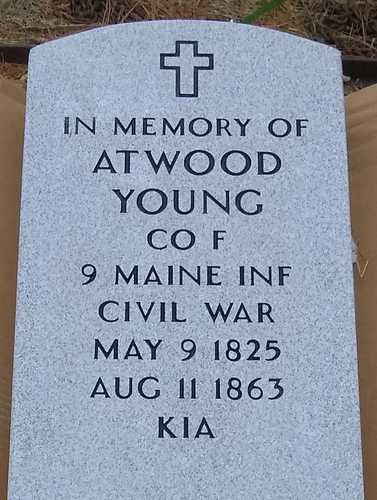Keywords: Civil War Battles
Item 28481
Civil War Soldiers' Monument postcard, Bath, ca. 1940
Contributed by: Patten Free Library Date: circa 1940 Location: Bath; Richmond; Frederick City Media: Postcard
Item 28472
Civil War letter, George Pepper, 1862
Contributed by: Patten Free Library Date: 1862-05-23 Location: Bath; York Media: Ink on paper
Exhibit
Meshach P. Larry: Civil War Letters
Meshach P. Larry, a Windham blacksmith, joined Maine's 17th Regiment Company H on August 18, 1862. Larry and his sister, Phebe, wrote to each other frequently during the Civil War, and his letters paint a vivid picture of the life of a soldier.
Exhibit
Civil War Soldiers Impact Pittsfield
Although not everyone in town supported the war effort, more than 200 Pittsfield men served in Civil War regiments. Several reminders of their service remain in the town.
Site Page
Maine and the Civil War - Offer for war battle images, Houlton, ca. 1862
"Offer for war battle images, Houlton, ca. 1862 Contributed by Aroostook County Historical and Art Museum Description A poster advertises…"
Site Page
"I think all the people that fought in the Civil War were really brave. One of the men that was part of the Civil War from Lincoln was William…"
Story
Civil War Soldier comes home after 158 years
by Jamison McAlister
Civil War Soldier comes home after 158 years
Story
A Maine Family's story of being Prisoners of War in Manila
by Nicki Griffin
As a child, born after the war, I would hear these stories - glad they were finally written down
Lesson Plan
Longfellow Studies: The Birth of An American Hero in "Paul Revere's Ride"
Grade Level: 9-12
Content Area: English Language Arts, Social Studies
The period of American history just prior to the Civil War required a mythology that would celebrate the strength of the individual, while fostering a sense of Nationalism. Longfellow saw Nationalism as a driving force, particularly important during this period and set out in his poem, "Paul Revere's Ride" to arm the people with the necessary ideology to face the oncoming hardships. "Paul Revere's Ride" was perfectly suited for such an age and is responsible for embedding in the American consciousness a sense of the cultural identity that was born during this defining period in American History.
It is Longfellow's interpretation and not the actual event that became what Dana Gioia terms "a timeless emblem of American courage and independence."
Gioia credits the poem's perseverance to the ease of the poem's presentation and subject matter. "Paul Revere's Ride" takes a complicated historical incident embedded in the politics of Revolutionary America and retells it with narrative clarity, emotional power, and masterful pacing,"(2).
Although there have been several movements to debunk "Paul Revere's Ride," due to its lack of historical accuracy, the poem has remained very much alive in our national consciousness. Warren Harding, president during the fashionable reign of debunk criticism, perhaps said it best when he remarked, "An iconoclastic American said there never was a ride by Paul Revere. Somebody made the ride, and stirred the minutemen in the colonies to fight the battle of Lexington, which was the beginning of independence in the new Republic of America. I love the story of Paul Revere, whether he rode or not" (Fischer 337). Thus, "despite every well-intentioned effort to correct it historically, Revere's story is for all practical purposes the one Longfellow created for him," (Calhoun 261). It was what Paul Revere's Ride came to symbolize that was important, not the actual details of the ride itself.












